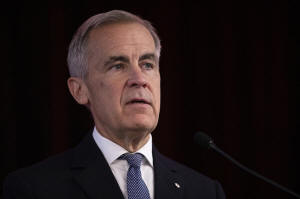Canada's Carney heads to Mexico to discuss trade before a review of
their US trade deal
[September 18, 2025]
TORONTO (AP) — Canadian Prime Minister Mark Carney heads to Mexico on
Thursday in an effort to diversify trade as America’s neighbors brace
for a review of the free trade deal with United States.
The United States-Mexico-Canada trade pact, or USMCA, is up for review
in 2026. More than 75% of Canada’s exports and more than 80% of Mexico’s
go to the U.S.
Canadian Sen. Peter Boehm said Carney and Mexican President Claudia
Sheinbaum will commiserate about U.S. President Donald Trump.
“What are they hearing from the Americans, what we are hearing. It’s an
opportunity to talk about how to handle the U.S. administration going
forward,” Boehm said.
Carney is looking to improve relations with Mexico during his two-day
visit after some of Canada’s provincial premiers talked last year about
cutting Mexico out of any new free trade deal with the U.S.
Trump lumped Canada in with Mexico on fentanyl smuggling and promised
sweeping tariffs on both countries.
Ontario Premier Doug Ford said then that Trump comparing Canada to the
Mexico was “the most insulting thing I’ve ever heard from our friends
and closet allies, the United States of America.”
Boehm said the comments by the premiers, which he deemed out of their
lane, upset the Mexicans.

“The Mexicans are particularly sensitive on these matters and there was
concern about that, no doubt,” Boehm said.
Boehm represented the Canadian government when Sheinbaum was sworn in as
Mexico’s president last year and is pushing for more engagement with
Mexico. He said relations recently improved, noting Mexico appreciated
Carney inviting Sheinbaum to the G7 summit in Alberta in June. Carney
also sent his foreign minister as well as his finance minister to meet
with Sheinbaum in August.
“A lot of people don’t realize that we trade more with Mexico than we do
with the entire European Union, all of the Europe, including the U.K.,”
Boehm said. “It’s a pretty big deal for us.”
Mexico is Canada’s third-largest trading partner after the U.S. and
China. Canada was Mexico’s fifth-largest trading partner in 2024.
But trade with the U.S. remains paramount for both countries and
preserving the free trade pact will be critical.
A key exemption for Canada and Mexico shields the vast majority of goods
from the punishing duties. Canadian and Mexican companies can claim
preferential treatment under the USMCA. But Trump has some
sector-specific tariffs, known as 232 tariffs, that are having an
impact. There is a 50% tariff on steel and aluminum imports.
[to top of second column] |

Prime Minister Mark Carney delivers opening remarks at the Liberal
caucus in Edmonton on Wednesday Sept. 10, 2025. (Amber Bracken/The
Canadian Press via AP)
 “Trump looms over this visit. Mexico
and Canada now share a common threat from the U.S,” said Nelson
Wiseman, professor emeritus at the University of Toronto.
“While both leaders are interested in expanding their countries
trade with each other, I think their priority is to strategize on
how to deal with Trump and the coming renegotiation of the USMCA.
Carney and Sheinbaum now recognize that tag-teaming Trump may be
more effective than competing for separate deals with Trump,
although they are still angling for them.”
Mexico and Canada have had different approaches to manage the
negotiations with Trump’s administration but both countries want to
increase bilateral commerce within the North American treaty.
“What we have discussed is how to strengthen trade between Mexico
and Canada as part of the trade agreement,” Sheinbaum said on
Wednesday.
“We obviously want to maintain the USMCA, and fortunately, the
working groups related to its review are already being set up,” she
added. This period of evaluation of the tripartite agreement will
take place before the formal review of the treaty that will begin
early 2026.
Mexico also wants to encourage more Canadian investment in the
country but Sheinbaum said the mining companies should respect
Mexican laws. “They have to follow with all environmental
regulations, which they have not necessarily fulfilled,” she said.
Canadian companies are the largest foreign investors in Mexico’s
mining sector, accounting for almost 70% of foreign investment in
the sector.
Carney will have a one-on-one meeting with Sheinbaum on Thursday.
There will then be a working lunch, which the leaders will be joined
by their cabinet ministers and secretaries. Carney will visit the
Canadian embassy on Friday.
___
Verza reported from Mexico City.
All contents © copyright 2025 Associated Press. All rights reserved
 |